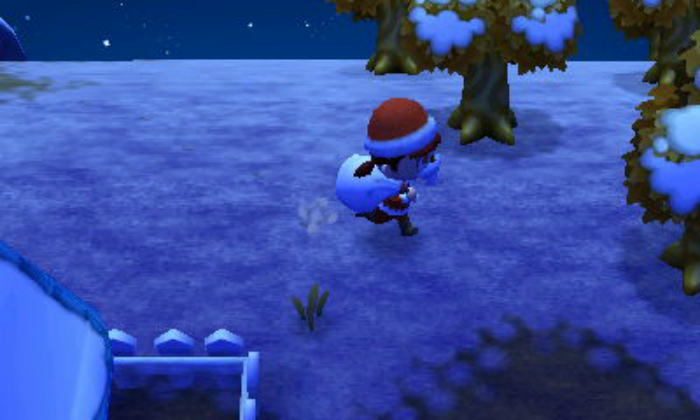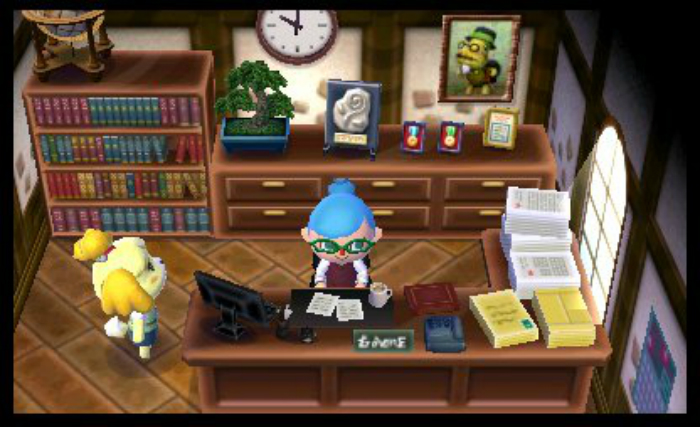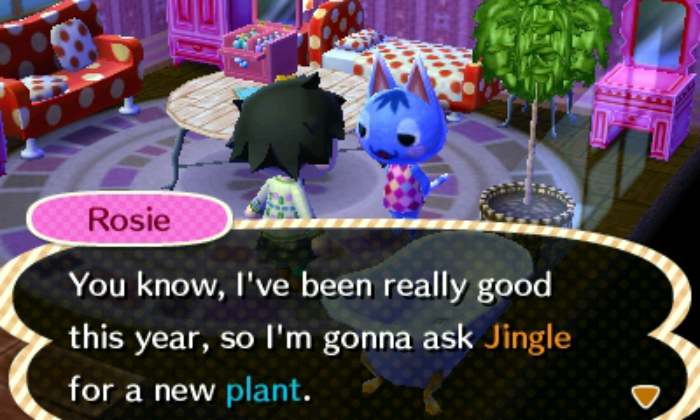Life Through Childlike Eyes in Animal Crossing
Perhaps it was the wine. Or the holiday sentimentality. But as I sat next to our sparkling pine, gifts spread out beneath like some form of decorative roots, I was struggling to hold back tears as I presented Maple with her present and she failed to hide her disappointment. It was, of course, entirely my fault. She had been telling me for days what she really wanted (though what that was remains lost to memory), but as is so often my tendency I failed to take note, treating her along with so many others as somehow unworthy of even a moderate amount of my attention. It was with increasing sadness that I watched this scene play out again, and again, as I visited Rosie, Fang, and Puck, each doing their best not to hurt my feelings despite how little I appeared to care for theirs. Only Olivia received the gift she truly wanted, but this was blind luck rather than careful planning, as I pulled another nondescript package out of my bag and hoped what was inside would be to her liking. I left her house feeling no less worthy of her thanks.

///
I have been playing (living?) Animal Crossing roughly half as long as I have been struggling through my own life. For my thirteenth birthday I received a Gamecube, and that following Christmas Animal Crossing (2001) entered my life and soon became as much a part of my routine as getting dressed or eating breakfast (occasionally superseding those pedestrian activities as I rushed to see what Tom Nook had in stock or what packages may have arrived at my digital home). It was hard for my mother to understand the enthusiasm with which I set about repaying my mortgage or systematically farming fruit, but even she found something to love in the zen-like activity of fishing off the coast.
Over the years I migrated from animal town to animal town, hopping from Gamecube to DS to Wii and back again whenever I reached the limits of one game and needed a new village to build up. Even when Animal Crossing stopped being a daily ritual I would still make sure to pop in on holidays, terrifying my neighbors who in my absence had assumed me to have left town or died in my basic bed.
It would be several years before I finally dove into New Leaf (2012) -the 3DS’s obligatory entry in the series and certainly the most expansive to date - a few weeks ago and discovered that little had changed. And yet there was undeniably something different this time around. Sure, there are some minor changes to the game’s structure (New Leaf has you acting as mayor this time around, giving you a bit more direct control over your town’s expansion) and Tom Nook is finally running a proper real-estate business instead of his previous back-alley con-job, but by and large this is still purely and unmistakably Animal Crossing and that’s still great.
What has changed, I discovered, was not the game; it was me.

///
Animal Crossing is often described as a life-sim, but while this categorization is fundamentally accurate it misses an important nuance that is ultimately the reason I believe Animal Crossing has continued to resonate with people for more than a decade. On paper, most of Animal Crossing’s core activities – paying your mortgage, earning money through menial activities, furnishing your home – are less than stimulating. Why then is the game so compulsively enjoyable where as these same activities in real life elicit only anxiety?
Though Animal Crossing draws from common life activities, it is distinct in that its depiction of them is filtered through a childlike understanding of how life works for adults. A mortgage is not a lifelong shackle but a ticket to bigger and better things. Money has value, but it literally falls from trees so why worry about spending it all on a nice sofa? All your neighbors are your friends, even the grumpy ones, and having a conversation is as easy as walking up to someone and asking "what’s new?"
What Animal Crossing encapsulates, what it excels at so entirely that it is barely discernible, is allowing the player to live their life how they imagined it might be as a child. All the messy social and economic details that we become privy to over the years are filed away in favor of a simpler life with easy pleasures. Your world in Animal Crossing is no larger than the town you live in, and this simplicity is mirrored in the enjoyably uncomplicated things you can get up to within it.
I can think of no point at which this is more perfectly displayed than on December 24, which Animal Crossing’s calendar denotes as “Toy Day.” The festive lights and Santa-dressed reindeer of course betray “Toy Day” as a transparent, agnostic stand-in for Christmas, but more than avoiding religious controversies this version of Christmas is distinctly driven by a child’s image of what Christmas is: a day of gifts. In the days leading up to the 24th, your animal neighbors bubble with excitement and anticipation, hoping that Jingle (read: Santa) will bring them their heart’s desire.

Even as I enter a period of my life where I am more excited to give than receive presents on Christmas day, it was hard not to get swept up in the enthusiasm of my townsfolk. And it is for this reason that I found myself emotionally distraught at having failed to play the part of Santa and given the wrong gifts to the wrong people. In Animal Crossing, you and everyone around you is perpetually a child existing in a sort of civilized Never Neverland. In failing to indulge with the rest of my digital village in “Toy Day” excitement (among other things), I betrayed my presence in this town as a jaded, anxious adult.
To play Animal Crossing truly, is to allow yourself to remember that life could be simple. Animal Crossing offers a return to a childlike state of mind without a reliance on explicit nostalgia, and that is an incredibly powerful thing to be given. As the world is metaphorically and literally burning down around us, a place as understandable as that of Animal Crossing that still offers some semblance of reality is easy to become lost in.
But as with every escape, there are limits to the time and mental energy that can be spent on what will only ever be an escape. That is not to say that time spent in Animal Crossing doesn’t matter, but that viewing it as a life-sim is missing the point. Animal Crossing is not about replicating reality, but giving us an idealized version of it where we can rest our heads and hearts and remember that not everything is as bad as it seems.
This is what I am missing when I load up my chunky handheld and wake up in my town of “Pudding.” I can’t let go enough for Animal Crossing to transport me somewhere else. Instead I start looking for things that don’t exist because they aren’t supposed to, wanting more from a game deliberately designed to give less than an exacting portrayal of “life.” I can still see the appeal, but I can no longer connect to it, and ultimately that’s nobody’s fault.
///
I have not played a tremendous amount of New Leaf since “Toy Day.” I am sure I will dip back into it every so often, decking out my home and befriending the bear that lives next door. I doubt, however, that the game will ever resonate with me the way previous Animal Crossings did. In the past, Animal Crossing let me feel as if I was grown up and on my own. Now, it allows me to go home to a simpler time with simpler problems. Both experiences are fundamentally the same but from different angles, but as my time with New Leaf has led me to discover, it is becoming harder and harder to see the world the way I did when I was younger.
There is value in the sobriety that comes with age and experience, but I think there is equal worth in remembering and cherishing our collective childhoods. Not to relapse into them, but to understand the things that are often lost as we journey into adulthood: that friendship is important, money is only as valuable as what you think of it, and that it is OK and necessary to take time out of our lives for self-care and healing. Animal Crossing offers so much of this for so many people and the significance of that should not be understated. I am thankful that Nintendo continues to offer a space for the weary and disenfranchised to find hope and relaxation, and I can only hope one day I am able to appreciate it like that again for myself.


